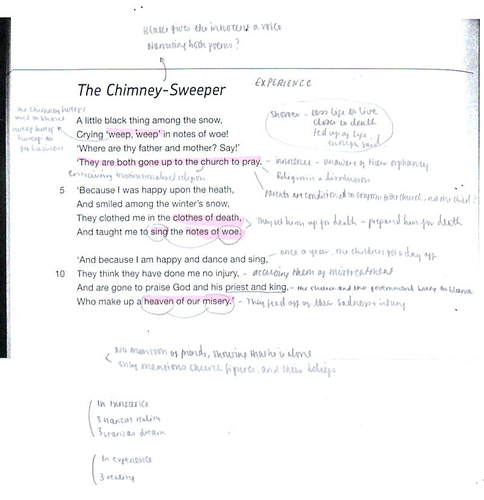The Chimney Sweeper William Blake Sparknotes
Likewise in The Little Black Boy which appears in the Songs of Innocence Blake takes on the subject of slavery which was still legal when the poem was published.
The chimney sweeper william blake sparknotes. The sweep meets a new recruit to the chimney sweeping gang named Tom Dacre who arrives terrified. One of them was sold by his father after the death of his mother. Theres little Tom Dacre who cried when his head.
Because I was happy upon the heath And smiled among the winters snow They clothed me in the clothes of death And taught me to sing the notes of woe. So your chimneys I sweep and in soot I sleep. Like many of Blakes most celebrated poems The Chimney Sweeper in both versions uses fairly straightforward language although some words of analysis may help to shed.
The Chimney Sweeper is the title of a poem by William Blake published in two parts in Songs of Innocence in 1789 and Songs of Experience in 1794. The Chimney Sweeper. The Chimney Sweeper a poem of six quatrains accompanied by William Blakes illustration appeared in Songs of Innocence in 1789 the year of the outbreak of.
The Chimney Sweeper Analysis In these twenty-four lines of William Blakes poem The Chimney Sweeper a young man is recounting Scott Hughes Mit Cv to the narrative of his miserable life just as the dismal stories of other stacks sweeper young men. Review the Poetry Essay Grading Rubric to see how your submission will be graded. The Praise of Chimney-Sweepers by Charles Lamb.
In 1789 the year of the beginning of the French Revolution Blake brought out his Songs of Innocence which included The Chimney Sweeper. Yet he bears no ill will accepting without question both his. The speaker of this poem is a small boy who was sold into the chimney-sweeping business when his mother died.
A little black thing among the snow by William Blake is a dark poem that sought to expose the horrors of child labor. Charles Lamb likes to meet a chimneysweeper but he is more interested in the young professionals than the grownup ones. Could scarcely cry Weep.
When my mother died I was very young And my father sold me while yet my tongue. Songs of Experience The Chimney-Sweeper. Say They are both gone up to the church to pray.
Blake intended to question some of the socially-accepted practices of the day that he found objectionable. Songs of Innocence The Chimney-Sweeper. Could scarcely cry weep.
The poem is narrated by a chimney sweeper. Where are thy father and mother. The Chimney Sweeper points to the suffering and misuse of children.
There are two Chimney Sweeper poems by William Blake. Weep So your chimneys I sweep in soot I sleep. The speaker comforts Tom who falls asleep and has a dream or vision of several chimney sweepers all locked in black coffins.
The Chimney Sweeper - William Blake Showing 1-13 of 13. Image result for praise of chimney sweepers summary. He recounts the story of a fellow chimney sweeper Tom Dacre who cried when his hair was shaved to prevent vermin and soot from infesting it.
After introducing us to Tom he relates a very strange dream that Tom had one night it involved chimney sweepers in coffins angels flying and a few other bizarre things. The poem The Chimney Sweeper is set against the dark background of child labour that was prominent in England in the late 18th and 19th centuries. He tells us a little bit about himself first before giving us the lowdown on another chimney sweeper Tom Dacre.
The Chimney Sweeper by William Blake. The poem is told from the perspective of a young chimney sweep a boy who has been sold into labor by his father. Weep in notes of woe.
The children had to survive and earn their livelihood by sweeping chimney at a very young age during the time of William Blake. He was good if eer a good. The poem is in the first person about a very young chimney sweeper who exposes the evils of chimney sweeping as a part of the.
It was first published in 1789. The Chimney Sweeper is a poem by William Blake published in his 1789 collection Songs of Innocence. This poem was written by William Blake a popular English poet.
The poem comprises the agony of children who were forced to live a miserable life. The Mariachis - Poetry Discussions. The Chimney Sweeper is a popular poem on account of its theme of poverty and the life of the working children.
In it he implies that slaves are closer to God because of their. Popularity of The Chimney Sweeper. In the first lines of The Chimney Sweeper the speaker describes a small black thing among the snow.
The Chimney Sweeper Summary from Songs of Innocence by William Blake - The poem The Chimney Sweeper from Songs of Innocence is about two children who are forced to work as sweepers in a Chimney. The first appeared in Songs of Innocence in 1789 while a second poem also called The Chimney Sweeper was included in Songs of Experience in 1794. The Chimney Sweeper.
A little black thing among the snow Crying. When my mother died I was very young by William Blake.
